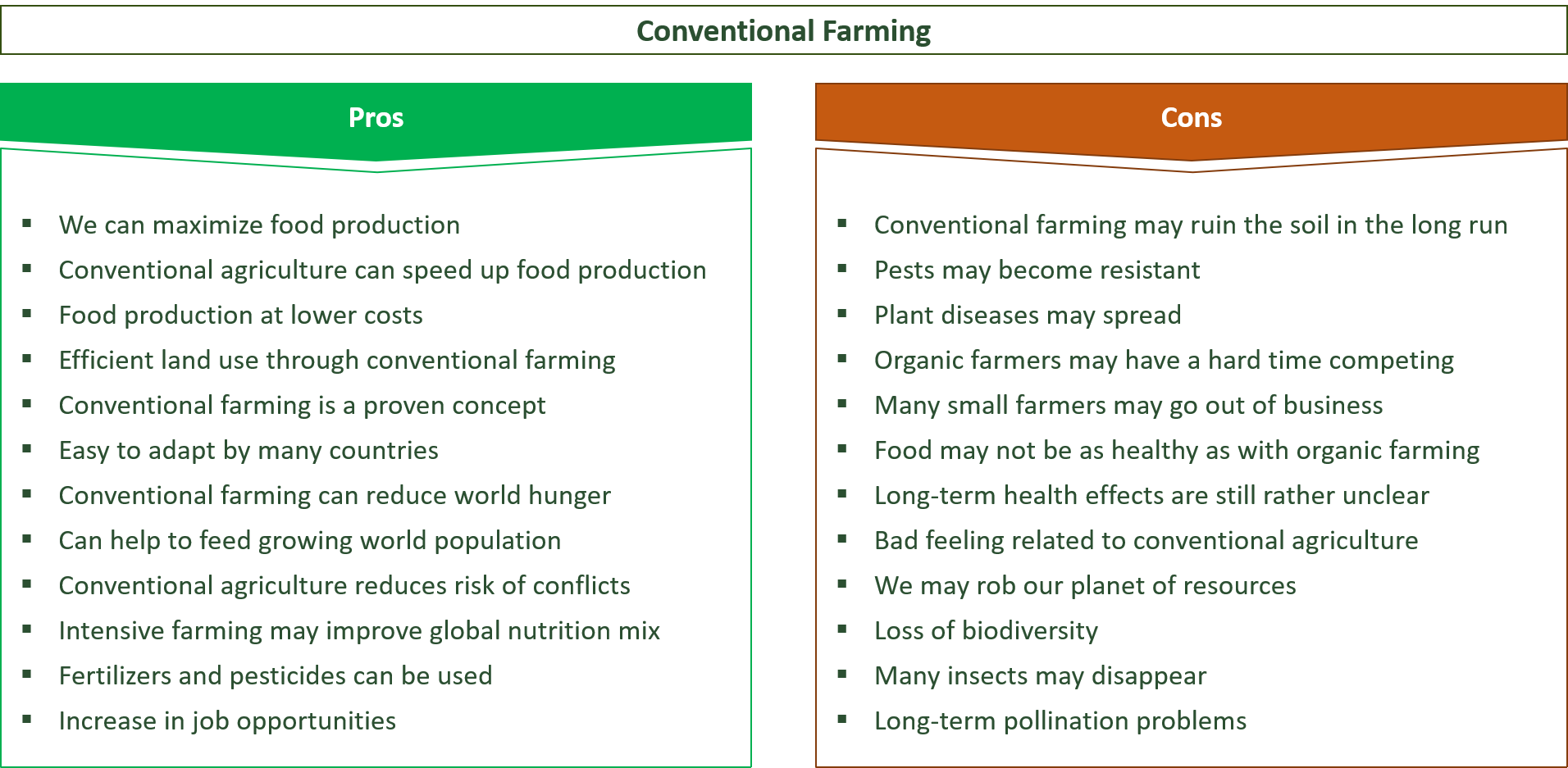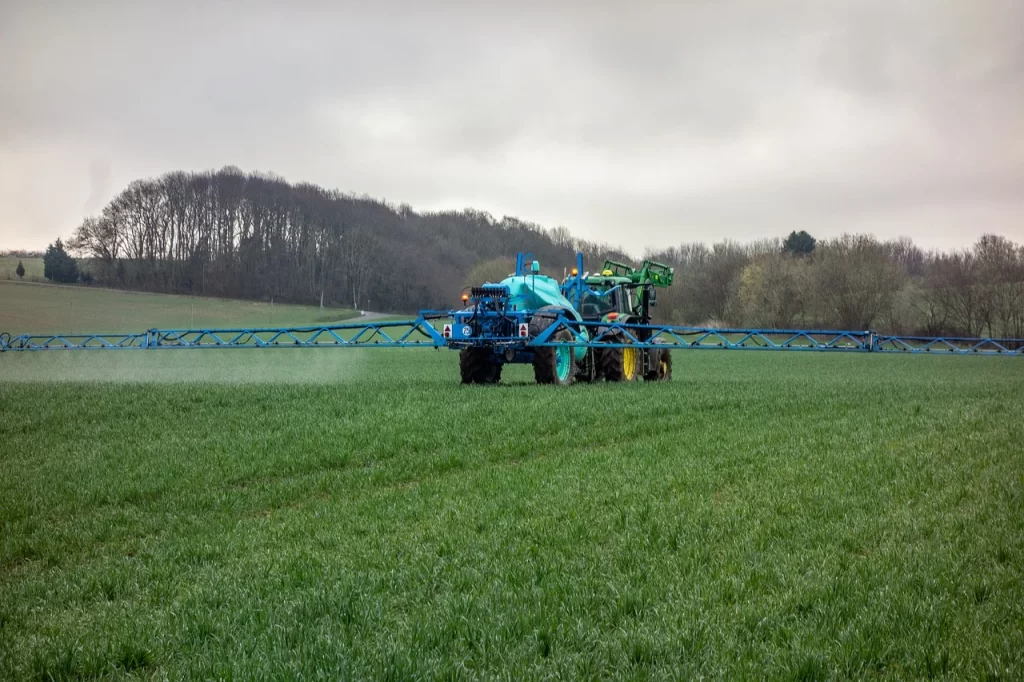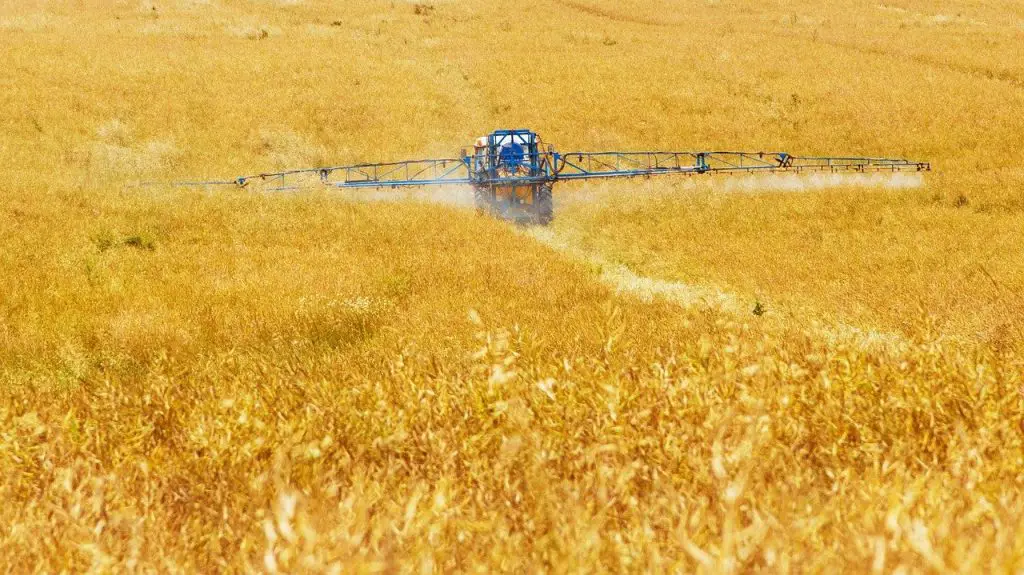Advantages & Disadvantages of Conventional Agriculture

Conventional farming has been used for many decades to ensure our food supply and to produce food at affordable prices.
However, while there are many advantages to conventional agriculture, there are also some downsides related to it.
In fact, all pros and cons of conventional farming are examined in this article.
Contents
Advantages of Conventional Farming
- We can maximize food production through intensive farming
- Conventional agriculture can speed up food production
- Conventional agriculture allows farmers to produce food at lower costs
- Efficient land use through conventional farming
- Conventional farming is a proven concept
- Easy to adapt by many countries
- Conventional farming can reduce world hunger
- Can help to feed growing world population
- Conventional agriculture reduces risk of conflicts
- Intensive farming may improve global nutrition mix
- Fertilizers and pesticides can be used
- Increase in job opportunities
We can maximize food production through intensive farming
One advantage of conventional farming is that we can maximize our food production.
While just a few centuries ago, people relied on most natural methods to produce foods, their yields had been significantly lower compared to today where all sorts of chemicals can be used to increase yields and to maximize profits.
Conventional agriculture can speed up food production
Not only can farmers maximize their yields through conventional farming, but they can also increase the speed at which food is produced since plants grow much faster through the use of genetically modified plants and by selecting optional lighting and growing conditions in general.
Conventional agriculture allows farmers to produce food at lower costs
Another upside to conventional agriculture is that farmers can also produce food at lower costs.
Since they can use their land as efficiently as possible and can also use certain substances to keep away pests and other diseases, farmers can maximize their yields and can decrease the cost per food unit significantly compared to organic farming or other farming alternatives where farmers go for quality than quantity.
Efficient land use through conventional farming
In general, intensive farming ensures most efficient land use since every square foot of agricultural land is used to maximize the production of vegetable or fruit harvests and no inch is wasted.
This is important since land prices are increasing on a regular basis and if we don’t use our land efficiently, many farmers may no longer be able to produce food at competitive prices and may go out of business in the long run since they will no longer be able to compete on a global level with poor countries where land is pretty cheap.
Conventional farming is a proven concept
Another benefit of intensive farming is that it is a proven concept and has been used for many decades.
Consequently, conventional farming is a stable concept on which people can rely on to ensure our food supply while many other farming methods have still not been used long enough to make a final verdict.
Easy to adapt by many countries
Since conventional farming is easy to understand and technologies are already mature, it can not only be used by rich Western countries but also by poor developing countries that urgently need to ramp up food production to feed a growing population and intensive farming can be great in this regard.
Conventional farming can reduce world hunger
Another reason why farmers should rely on conventional farming is that it can reduce world hunger in general.
Since food can be produced at pretty low cost and output and production can be maximized, conventional farming can feed many people and reduce global hunger while alternative farming methods may not be efficient enough to do this on a global scale.
Can help to feed growing world population
We all know that our world population is growing and with a growing number of people on our planet, we also need an increase in food production so that we can feed people on a global scale.
Consequently, most efficient land use in food production is crucial so that we can optimize food production output to feed as many people as possible.
Conventional agriculture reduces risk of conflicts
Food scarcity has always been a major cause of serious conflicts.
Hence, it is important that we reduce this source of tension using conventional agriculture to ramp up food production and to feed our world population so that conflicts between countries and also within a country decrease.
Intensive farming may improve global nutrition mix
Since an increasing number of people may get access to various foods, many people will also be able to improve their nutrition mix and may be able to eat healthier and also to get more vitamins and many other things our bodies need to stay healthy in the long run.
Fertilizers and pesticides can be used
While organic farming tries to avoid the use of conventional fertilizers and pesticides, those substances are often used in conventional farming to maximize the output and also to keep away pests that may destroy crop yields. In turn, crop yields will be much higher on average and production prices lower compared to organic agriculture.
Increase in job opportunities
Since food production can be increased, more people who harvest and process foods will be needed and this means that more people will find a job in the food industry. In turn, more people may be able to get out of poverty.
As you can see, there are many advantages and disadvantages to intensive farming. However, now that we have talked about the benefits that come along with it, we should also talk about the downsides of conventional farming to give you a better picture of reality in this regard.

Disadvantages of Conventional Farming
- Conventional farming may ruin the soil in the long run
- Pests may become resistant
- Plant diseases may spread
- Organic farmers may have a hard time competing
- Many small farmers may go out of business
- Food may not be as healthy as with organic farming
- Long-term health effects are still rather unclear
- Many people have a bad feeling with conventional agriculture
- We may rob our planet of resources
- Loss of biodiversity
- Many insects may disappear
- Long-term pollination problems
Conventional farming may ruin the soil in the long run
While conventional farming can maximize crop yields in the short run, the use of fertilizers and pests in an excessive manner may ruin the soil in the long run and farmers may no longer be able to produce enough food in the future.
Pests may become resistant
Another problem with conventional farming is that through the excessive use of pesticides, pests may become resistant and conventional pesticides may longer work just a few years from now.
Consequently, many farmers may no longer be able to keep away pests from their fields and may lose a significant fraction of their yields to pests every year.
Plant diseases may spread
Since plants have been genetically modified to maximize food production and output, they have also become relatively weak and vulnerable to diseases.
At one point in time, plant diseases may spread pretty easily and may significantly lower crop yields for many years or even decades.
Organic farmers may have a hard time competing
Another downside to intensive farming is that organic farmers may have a hard time competing since they will produce food at higher costs and if not enough people are willing to pay those higher prices for better-quality food, many organic farmers may have to close down their businesses in the future and many jobs will be lost.
Many small farmers may go out of business
Not only organic farmers struggle to compete with big conventional farming companies, but also small farmers may go out of business sooner or later since they are often not able to scale as much as big farmers and will therefore have higher production costs.
In turn, they have to demand higher prices for their products and may no longer be able to sell them on a global market where competition is pretty fierce.
Food may not be as healthy as with organic farming
Another disadvantage of conventional farming is that food may simply not be as healthy as with organic farming since excessive amounts of fertilizers and pesticides are used and those substances will also stick to crops.
In turn, when we buy conventional farming products, we will also eat food contaminated with chemical substances and this may not be good for our bodies in the long run.
Long-term health effects are still rather unclear
While we have used conventional agriculture for some decades, we can still not be entirely sure what effects it has on our genes in the long run since those effects may just show hundreds or thousands of years from now and relying on organic farming may therefore be a safer way to produce our food.
Many people have a bad feeling with conventional agriculture
Over the past years, many people have become aware of the problems of conventional agriculture and try to buy local and organic products instead to support local farmers and also to eat healthier.
In fact, many people don’t trust conventional farming anymore and search for an alternative.
Thus, if you also have a guilty conscious relying on conventional farming products, it may also be time for you to switch to organic products to get a better feeling.
We may rob our planet of resources
Conventional agriculture is also often criticized for robbing our planet of resources since everything is optimized for maximizing profits and yields while most conventional farmers don’t care enough about our ecosystems and about the adverse effects of conventional farming on our planet.
Loss of biodiversity
Through conventional farming and the use of pesticides and chemical fertilizers and deforestation related to intensive farming, many species may become endangered or even extinct in the near future and overall biodiversity loss may lead to ecological imbalance in the long run, with rather unclear effects on our planet and also on humanity.
Many insects may disappear
Not only many animals may disappear since their natural habitats may get destroyed, but also many insects may vanish due to the excessive use of chemical substances in conventional crop production and this may really hurt nature in the long run.
Long-term pollination problems
In case many insects vanish, this may also lead to significant pollination problems since bees and other insects will no longer be able to pollinate plants and crop yields may drop significantly due to that.

Top 10 Conventional Farming Pros & Cons – Summary List
| Conventional Farming Pros | Conventional Farming Cons |
|---|---|
| Conventional farming increases food production | Use of pesticides in conventional farming |
| Conventional agriculture leads to lower prices | Unhealthier food production |
| More efficient land use | May ruin the soil in the long run |
| May decrease global hunger | Decreasing yields in the future |
| Better food supply | Spread of plant diseases |
| Conventional farming as proven concept | Resistant pests will become more common |
| May improve global nutrition mix | Problem for many small farmers |
| More jobs in the farming sector | Organic farmers may not be able to compete |
| Opportunity to get out of poverty | Bad feeling related to conventional farming |
| May help feed growing world population | Global transportation implies carbon emissions |
Should We Use Conventional Agriculture?
As you can see, there are many advantages and disadvantages related to conventional farming.
While it is an important tool to maximize food production, it still comes along with adverse long-term effects and whenever possible, we would therefore rely on organic farming methods instead to assure a livable future for the next generations in the long run while still ensuring a working food supply at the same time.
Sources
https://www.appropedia.org/Conventional_farming
https://en.wikipedia.org/wiki/Intensive_farming

About the author
My name is Andreas and my mission is to educate people of all ages about our environmental problems and how everyone can make a contribution to mitigate these issues.
As I went to university and got my Master’s degree in Economics, I did plenty of research in the field of Development Economics.
After finishing university, I traveled around the world. From this time on, I wanted to make a contribution to ensure a livable future for the next generations in every part of our beautiful planet.
Wanna make a contribution to save our environment? Share it!
